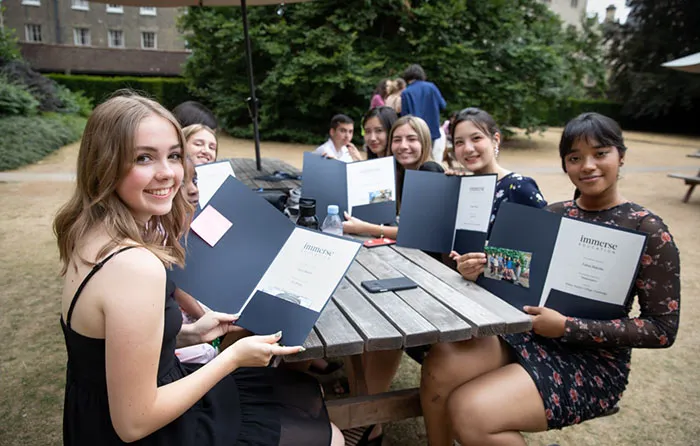The Extended Project Qualification (EPQ) is essentially an extra project you can complete during your A-Level studies. Introduced in 2006 by Sir Mike Tomlinson, the EPQ can be a fantastic way to improve your skills, prepare for higher education, and make yourself more appealing to top universities- not least because it contributes to your UCAS points. If that sounds interesting, here’s everything you need to know about the EPQ.
What is an EPQ?
In short, the EPQ is a standalone qualification similar to an A-Level. Most often, it takes the form of an extended essay, like a mini-dissertation. However, there are four ways to complete the project:
- Dissertation: A 5000-6000-word piece of independent, research-informed writing.
- Investigation/Field Study: Similar to the dissertation, but informed by primary research research, such as lab-based experiments or fieldwork.
- Performance: A performance created and given by the student, accompanied by a 1000-word analysis.
- Artefact: Media, artwork (including 2D art and sculptures), or technical products produced by the student and accompanied by a 1000-word analysis.
Students can choose their own topic, which gives them a chance to research something they’re interested in, even if it isn’t related to their studies. However, it’s usually a good idea to choose something related to your intended university degree. This can help you become a more critical and independent learner in your subject of interest (more on the benefits of completing an EPQ below).
Alongside the project itself, you’ll also need to create a logbook of your work and present your findings at the end.

Benefits of Completing an EPQ
Completing an EPQ has numerous benefits. Some of these benefits are related to your personal development as a student, and others concern getting into university.
Some of the benefits include:
- Becoming a more independent learner with enhanced critical and reflective thinking skills.
- Developing decision-making and problem-solving skills.
- Learning how to plan, research, analyse, present, and more.
- Learning how to confidently apply technologies to your studies.
- Improving your A-Level scores thanks to your new skills.
- Becoming a more attractive university prospect.
Most students undertake the EPQ in preparation for their university studies, but others do it because they have a topic they’re excited to research.
However, while these benefits are profound, there are some drawbacks of completing an EPQ.

Pros and Cons of Doing an EPQ
The EPQ is not for everyone, so you should take careful consideration before applying. Here are some pros and cons to help you decide.
| Pros of the EPQ | Cons of the EPQ |
| You can earn extra UCAS Points. | It takes up a lot of your time while you’re completing your A Levels. |
| It helps you develop useful soft skills. | It’s a difficult qualification, especially if writing essays doesn’t come naturally to you. |
| You can focus on your interests and passions. | It can be very stressful. |
What Do Universities Think of the EPQ?
For many students, how universities view the EPQ is an important deciding factor. Generally, universities look favourably towards it as an extra qualification, and they understand that students pick up extra skills that could be useful in their studies.
Currently, all 24 Russell Group universities accept the EPQ as a qualification. Some universities lower their grade offerings for students with an EPQ, acknowledging the independent research and analysis skills gained during its completion.
Furthermore, both Oxbridge universities accept this qualification. Oxford states that the EPQ won’t impact its offer, but says, “the EPQ will provide an applicant with the opportunity to develop research and academic skills relevant for study at Oxford. Candidates are encouraged to draw upon relevant EPQ experience when writing their personal statement.”
Meanwhile, Cambridge actively encourages the EPQ. The website says, “We encourage applicants to take an EPQ. It will help to develop independent study and research skills, which are valuable for higher education.”
In part, the positive view of this qualification is down to the EPQ UCAS points.
| What Is An EPQ Worth? | |
| Grade | UCAS Points |
| A* | 28 |
| A | 24 |
| B | 20 |
| C | 16 |
| D | 12 |
| E | 8 |
Students can obtain up to 28 UCAS Points for their EPQ, which is always an attractive prospect to universities.
Join the Immerse Education 2025 Essay Competition
Follow the instructions to write and submit your best essay for a chance to be awarded a 100% scholarship.

Is an EPQ Equivalent to an A-Level?
There is some confusion around EPQ, A-Level, and other further education qualifications. Primarily, many students want to know: what qualification is an EPQ?
An EPQ is not an A-Level. Instead, it’s an additional qualification that you take at sixth form or college alongside your other qualifications such as BTECs or A-Levels.
Read our article: A-Level requirement for popular university degrees
It can be helpful to frame this another way–what is an EPQ equivalent to? Essentially, it is worth around half of an A-Level. An A* at A-Level earns you 56 points, while the same grade in the EPQ is worth 28. In other words, it’s similar to an AS-Level.
How Many Hours Per Week Should Be Spent on an EPQ?
One of the primary challenges of the EPQ is time management. After all, you have to balance your research with studying for your other subjects.
You have around six months to complete the entire project, which is roughly 130 weekdays. However, many schools set early deadlines so that the EPQ is out of the way before exams.The AQA recommends spending at least 120 hours on your project, which includes researching, writing, and creating a logbook.
You can manage your time however you choose. Remember that, for standard A Levels, you should spend 5 hours per week studying outside of school. For the EPQ, 30-45 minutes per day is usually enough. Ideally, you should spend longer on your A-Levels, since these are worth more points.

General Facts About the EPQ
If you’re still undecided, it can help to learn more about it. Here’s more information.
What Topic Can You Do Your Project on?
You can complete a project on any topic of your choice. It’s a good idea to choose something that you’re passionate about or you intend to study at university. It’s also recommended to pick a subject that isn’t too broad, and something with a decent amount of academic research to draw on during your project.
For topic inspiration, read our article: 600 EPQ Ideas and Examples – The Ultimate List
How is the EPQ Graded?
EPQs are graded A* to E, with UCAS Points awarded for each grade. The marking schemes vary depending on the overseeing body.
Generally, the weighting is as follows:
- 20% for project planning and time management
- 20% for using resources and research skills
- 40% for developing an idea and producing the outcome
- 20% for reflection and presentation
How Does the EPQ Affect Learning?
According to Cambridge research, there is a significant correlation between students who take the EPQ and students who progress to higher education. This is consistent even after taking into account prior attainment.
Cambridge also found that EPQ students were less likely to drop out of university, though the difference between EPQ and non-EPQ students is minimal because drop-out rates were low throughout the study.
Other research from AQI suggests that EPQ students are more likely to obtain high grades at university. Between 2017 and 2021, the proportion of EPQ students with a high-grade degree (a 1st or a 2:1) was always over 90%. Meanwhile, the cohort of students without EPQs never exceeded 90%.
What Grades Do Most People Get?
Grades vary from year to year. However, a lot of EPQ students are high-performing and can obtain a great grade.
According to the AQA, 22.6% of students in 2022 received an A*, 26.5% got an A, and 21% got a B.
How Common is the EPQ?
The EPQ is fairly common. Between 2008 and 2013, it was mandatory as part of the 14-19 Diploma.
These days, around 30,000 students take this qualification each year.

How Do You Get a Good Grade?
If you’re looking to get an A*, there are a few steps you can take. Firstly, look at the mark scheme to get an idea of how you can reach full marks. Then, you can work backwards to find an interesting topic with lots of potential.
From there, here are some extra tips:
- Check out our study tips guide to learn more about research
- Pick a topic that has lots of academic research
- Find a question that interests you and that you can create a unique angle on
- Plan ahead
- Fill in your log as you go so you don’t waste time at the end
- Go into detail in your writing
- Take your time, and try not to rush it
- Learn how to write an amazing academic essay
With these tips in mind, you’re well on your way to getting a good grade for your EPQ.
Should You Take an EPQ?
There are plenty of reasons to take an EPQ, from increasing your university prospects to learning new skills, or even the opportunity to learn more about your passion. However, the EPQ is not suitable for everyone; it’s a long qualification that adds extra time to your studies.
You don’t need an EPQ to get into university, so if it’s not for you, then that’s okay. Nevertheless, if you’re interested in a top university, it could be worth considering to set you apart.
Get Expert Assistance
If you’re thinking about completing your EPQ, don’t do it alone. Get expert help and advice from Oxbridge academics, ready to guide you throughout the process and hone your skills. Here at Immerse Education, we’re excited to help you on your path to an excellent university and beyond.
Seeking a programme that not only helps develop critical thinking and research skills but also awards UCAS points? Try our Accredited Online Research Programme which awards 8 UCAS points upon completion today.























